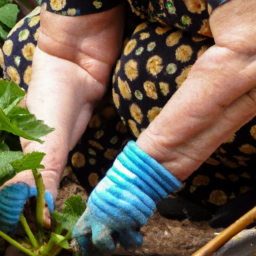Gardening for Elderly Benefits
How Does Gardening Help The Elderly
Are you looking to ease the burden of some of your elderly relatives? Gardening could be the perfect way to make sure they stay active and enjoy their golden years. Gardening can do wonders for any age, but it's especially helpful for the elderly. Let's take a look at how gardening can help the elderly and the many different ways that it can benefit them.
Introduction
As life expectancy continues to creep up year after year, it's important to consider ways that we can keep the elderly healthy and active. Gardening is a great way to do this, as it's an activity that can be enjoyed by people of any age. Gardening can provide the elderly with beneficial physical and mental health benefits that can help them stay active and engaged in their life.
Physical Benefits
When you're gardening, you're not just sitting in the sun; you're doing real work. Gardening requires heavy lifting, repetitive motions, and a lot of walking. This makes gardening an excellent way for the elderly to stay physically active. Working in a garden can improve strength, flexibility, and balance. It can also help reduce the risk of falling, which is a major concern for the elderly.
Strength
Gardening is a great way for the elderly to strengthen their muscles and improve their balance. It requires repetitive motions to push a wheelbarrow, pick up heavy bags of soil, and lift large containers. All of these activities can help strengthen an elderly person's core, arms, and legs.
Flexibility
Working in a garden can help an elderly person become more flexible. Gardening requires bending and stretching which can help increase flexibility. This can help the elderly remain active and reduce their risk of falls.
Balance
Gardening requires good balance. Walking around a garden, lifting heavy objects, and bending and stretching can all help an elderly person improve their balance and stay steady on their feet.
Mental Benefits
Gardening isn't just good for physical health; it's also a great way to stay mentally active. Working in a garden gives the elderly an opportunity to engage in creative and problem-solving activities. Gardening can also reduce stress and help an elderly person stay mentally sharp.
Engaging Activities
Gardening provides elderly people with a variety of creative activities that will keep them engaged. From planting a new flowerbed to fixing a broken irrigation system, there's always something to do in a garden. This can help provide an elderly person with a sense of purpose and give them something to look forward to.
Stress Relief
Gardening can be a great way to reduce stress and clear the mind. Working in a garden gives elderly people a quiet, peaceful environment to work in and take their minds off of the worries of life. It can also help reduce feelings of loneliness or isolation, as gardening can be a great way to connect with others.
Mental Stimulation
Gardening can also help an elderly person stay mentally sharp. Tasks such as problem-solving and planning can help keep the mind active and help an elderly person stay mentally sharp for longer.
Conclusion
Gardening can do wonders for the elderly. It can provide them with physical and mental benefits, and it can also give them something to do that they enjoy. Gardening is a great way to make sure your elderly relatives stay active and engaged in life. So, why not take a few minutes to show them how much you care and help them get outside and garden.

Previous Page
Next Page
